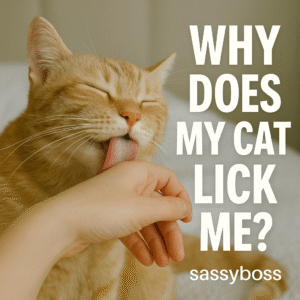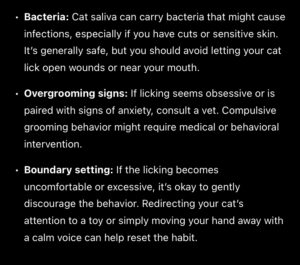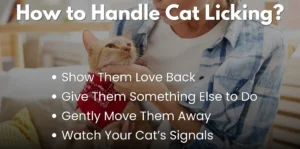Why Does My Cat Lick Me? Understanding the Feline Tongue of Affection
If you own a cat, you have undoubtedly encountered the strange but charming phenomenon of your feline licking you. It could be your face, hand, arm, or even your hair. There is a lot going on behind this seemingly straightforward behavior, even though it may appear random or just plain strange. What makes your cat lick you, then? Feline instincts, social ties, and even a little affection are the foundation of the solution.
Let’s break down the many reasons behind this quirky kitty behavior.

1. A Sign of Affection and Bonding
Your cat licking you to express affection is one of the sweetest reasons. Grooming is a social activity called “all grooming” in the feline world. When your cat licks you, it’s basically saying, “You’re part of my tribe.” Cats frequently lick each other to strengthen social relationships.
Usually, this habit begins when the kitten is young. To keep them clean, soothe them, and forge a close attachment, a mother cat will lick her kittens. Cats continue this tendency throughout maturity as they get older. Hence, a few licks from your pet indicates that they consider you to be a member of their family.
2. Marking You as Theirs
Scent glands can be found in cats’ lips and other parts of their bodies. Your cat is not only grooming you when they lick you; they are also leaving their fragrance behind. By doing this, they subtly designate you as belonging to their domain and assert possession.
Really, it’s a complement. You are someone your cat wants to keep an eye on. To let the other cats (and possibly dogs) know, they are saying, “You belong to me.”
3. You Taste Good!
Let’s face it: your cat may lick you just because you taste delicious. Cats are extremely sensitive to smell and taste, whether it’s the salt from your perspiration, the remains of your most recent snack, or the aroma of soap or lotion.
Certain cats may have a special interest in scents, and licking is simply their method of learning more. Your cat can decide to give you a taste test if you’ve recently eaten anything or used scented lotion.
4. Stress or Anxiety Relief
Some cats use licking as a self-soothing mechanism, much like people may bite their nails or fidget when under stress. Overgrooming is a common way that they target themselves, but they might also target their favorite person.
Your cat may be bored or anxious if they are licking you excessively, especially if it seems compulsive or tense. In this situation, it’s important to look for stressors in their surroundings. A change in routine, new pets, loud noises, or a lack of stimulation can all cause anxiety in cats.
Offering more playtime, puzzle toys, or even calming pheromone diffusers can help redirect this behavior in a healthier direction.
5. You’re Part of Their Routine
Cats are habitual animals. They thrive on repetition and routine. Your cat may have just come to associate licking you with comfort and consistency if it has been a daily ritual, such as during cuddling time on the couch or as you go to sleep.
In these cases, licking is less about specific motivation and more about ritual. It’s part of their “love language,” and in their eyes, they’re just doing their job.
6. Mimicking Kitten Behavior
Adult cats occasionally continue to exhibit kitten-like traits throughout adulthood, particularly if they had early separation from their moms or littermates. Like a youngster with a security blanket, licking (and occasionally sucking) on soft objects or yourself can be a source of comfort.
If your cat was adopted at a very young age, they might lick more frequently as a substitute for the maternal grooming they missed out on.
7. A Call for Attention
Your cat may be attempting to get your attention if they begin licking you and then meow, purr, or even give you a little nip. Licking can be their way of expressing, “Hey, look at me!” whether they want food, playing, or just plain old affection. Cats are intelligent. They will remember that behavior and repeat it again when they want interaction if they observe that licking you results in a response, even if it’s simply you chatting to them or caressing them back.
#Should You Let Your Cat Lick You?
It’s up to you whether or not you let your cat lick you. It’s usually innocuous and even pleasant. But there are a few things to think about:

How to Discourage Excessive Licking
If you enjoy your cat’s affection but the licking is getting out of hand, there are a few things you can try:
• Offer alternatives: Provide toys, catnip, or treats to redirect their behavior.
• Create a calm environment: Ensure your cat isn’t stressed. Soft lighting, quiet spaces, and routine can help.
• Positive reinforcement: Reward your cat for calm behavior and try not to react too dramatically when they lick — even negative attention can reinforce the behavior.
• Use scent deterrents: Some owners use safe, scent-based deterrents like citrus lotions on areas they don’t want their cats .

Final Thoughts
When your cat licks you, it’s rarely random. Whether they’re expressing love, claiming you as theirs, or just think you taste a little like chicken, licking is a deeply rooted feline behavior that usually comes from a place of comfort and connection.
So next time your kitty gives you a few affectionate licks, take it as a compliment — a slightly slobbery, sandpaper-y compliment, but a sweet one nonetheless.
